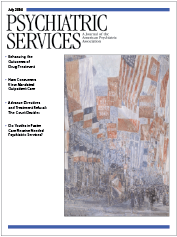Effect of Voluntariness of Participation in Treatment on Short-Term Outcome of Inpatients With Schizophrenia
Abstract
OBJECTIVE: The purpose of this study was to examine associations between the voluntary or coercive nature of patients' participation in inpatient treatment and the short-term outcome of inpatient treatment for patients with schizophrenia. METHODS: Eighty-eight adult patients with schizophrenia and delusional disorders who were consecutively admitted to a 320-bed psychiatric hospital in southern Germany over a three-month period in 2002 were assessed with the Positive and Negative Syndrome Scale (PANSS) and the Global Assessment of Functioning (GAF) at admission and discharge, a mean of 36.2 days later. The patients were grouped by whether their participation was voluntary or involuntary in each of five aspects of inpatient treatment: admission, hospital stay, medication, discharge, and intention to continue treatment after discharge. Outcome was defined as the change between admission and discharge in scores on the PANSS and the GAF and change in those scores per inpatient day. RESULTS: The outcome measures were not significantly related to the voluntariness of patients' participation in any aspect of treatment. CONCLUSIONS: The short-term outcome of inpatient treatment is independent of whether treatment is voluntary.



